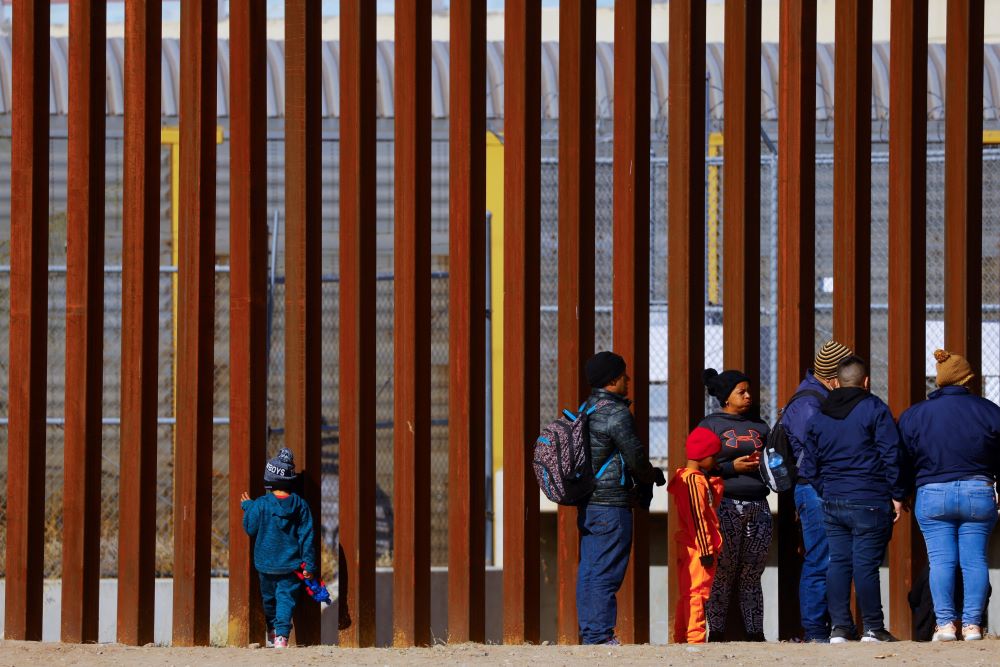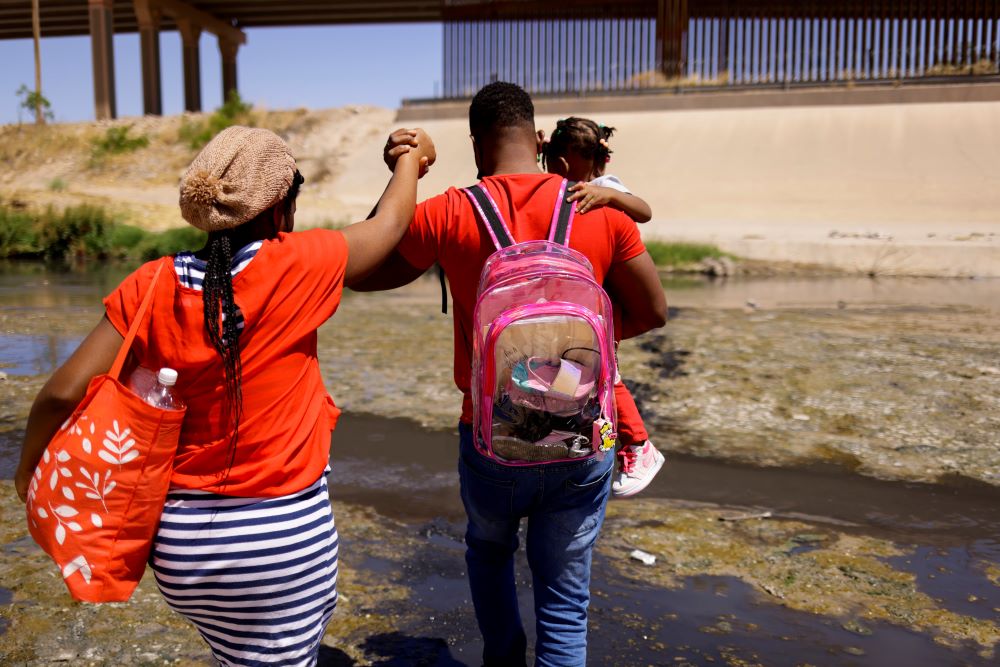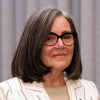
George, 5, a migrant boy from Venezuela traveling with his family, looks through the border wall as family members line up to request asylum in El Paso, Texas, Dec. 27, 2022. (OSV News/Reuters/Jose Luis Gonzalez)
In his poignant message for the World Day of Migrants and Refugees 2024, Pope Francis reminds us, "God walks with his people." A Vatican website about the Sept. 29 observation characterizes migrants as a "contemporary icon of God's people on a journey" and urges us to encounter the divine in the vulnerable among us.
As someone who has dedicated my life to serving immigrants, this message resonates to my core. Over the years, I have had the privilege of working with countless individuals who embody courage, resilience and hope — qualities that reflect God's presence in them, as bearers of God's image. At the Catholic Legal Immigration Network, Inc. (CLINIC), we daily encounter stories that reveal the profound dignity and the humanity of migrants and refugees.
Take Maria from El Salvador, for instance, who fled gang violence that had claimed the lives of her brother and father. Maria made the treacherous journey north with her young daughter, clutching nothing but a small backpack and her faith. She traversed dangerous terrain, faced the constant threat of exploitation and endured harsh conditions. Yet, throughout her journey, Maria remained resolute, driven by the hope of a safer, more peaceful life for her child. Her story is one of profound resilience and courage, embodying the spirit of so many who seek refuge.
These clients of ours, like so many others, are living testaments to the human capacity for hope and renewal. In them, we see the enduring strength of the human spirit and the unmistakable imprint of the divine.
Then there's Ahmed, a skilled artisan from Syria whose life was upended by the devastation of civil war. Before the conflict, Ahmed ran a successful workshop, creating intricate wood carvings that were cherished in his community. When the war reached his hometown, he was forced to flee, leaving behind his livelihood and the only life he had ever known. Ahmed's journey to safety was perilous, involving dangerous sea crossings and uncertainty at every turn. He arrived in a foreign land, not just as a refugee seeking asylum, but as a father determined to rebuild a future for his family. Despite the challenges, Ahmed continues to use art to tell his story and preserve his cultural heritage, even in a new and unfamiliar place.
These individuals are not mere statistics or abstract concepts; they are real people whose lives have been uprooted and dreams deferred, but whose spirits remain unbroken. These clients of ours, like so many others, are living testaments to the human capacity for hope and renewal. In them, we see the enduring strength of the human spirit and the unmistakable imprint of the divine.
In a world increasingly divided — physically by borders and ideologically by politics — it is easy to forget that migration is a fundamental part of the human experience. Throughout history, people have moved in search of safety, opportunity and a better life. Yet today, migrants and refugees often find themselves vilified and marginalized. This dehumanization blinds us to their intrinsic dignity and diminishes our own humanity.
Pope Francis' message calls us to a radical reimagining: to see migrants and refugees not as "others," but as our brothers and sisters. This perspective challenges us to move beyond fear and prejudice, to open our hearts and minds, and to recognize the divine presence in every person, regardless of their status or nationality.

An asylum-seeking migrant family from Haiti cross the Rio Bravo to surrender to U.S Border Patrol agents to request asylum in El Paso, Texas, as seen from Ciudad Juarez, Mexico, April 22, 2022. (OSV News/Reuters/Jose Luis Gonzalez)
Many of my clients have become mentors for me in my faith, helping me learn that suffering has transformative power and that God walks closely with us, giving us the grace to choose compassion in the face of extreme hardship.
My client Lilibeth, for example, is a Honduran asylum seeker who endured immense pain and hardship due to her husband's struggles with drug and alcohol abuse. Shortly before his premature death, she forgave her husband for the suffering he caused her and their children. When someone like Lilibeth is vilified and rejected for the way they entered our country, we miss the opportunity to know them in their fullness and recognize the witness they can provide of faith and mercy amid suffering.
When we take the time to listen to the stories of migrants and refugees, when we see them as individuals with dreams and aspirations, we begin to break down the walls of ignorance and indifference. We begin to see the face of God in the weary traveler, in the persecuted and in those seeking refuge.
This is not just a moral imperative; it is a profound spiritual opportunity. By welcoming migrants and refugees into our communities, we are not merely offering them a haven; we are inviting them to enrich our lives and expand our understanding of God's boundless love and mercy.
At CLINIC, our mission is grounded in the belief that every person has inherent dignity and deserves to live in safety and peace. We work to provide legal assistance, advocacy and support to migrants and refugees, helping them navigate the complex and often intimidating immigration legal system. But beyond the legal services, our work is about building bridges of understanding.
Advertisement
Pope Francis' words remind us that we are all on a journey together. In walking with migrants and refugees, we are not only helping them, we are joining them in a shared pilgrimage toward a more just and compassionate world. This journey requires us to confront our own prejudices, to challenge unjust systems and to advocate for policies that protect and uplift the most vulnerable.
As we reflect on Pope Francis' message, let us commit to seeing migrants and refugees as the contemporary icons of God's people that they are. Let us challenge ourselves and others to look beyond stereotypes and to recognize the divine in every person. And let us take concrete actions — through advocacy, volunteering or simply educating ourselves and others — to support people who are journeying toward a better life.
In doing so, we not only fulfill our moral and spiritual duties, but we also open our hearts to the transformative power of compassion. Together, we can create a world where every person is seen, valued and welcomed — where the dignity of all is upheld, and the boundless love of God is reflected in how we treat one another.








